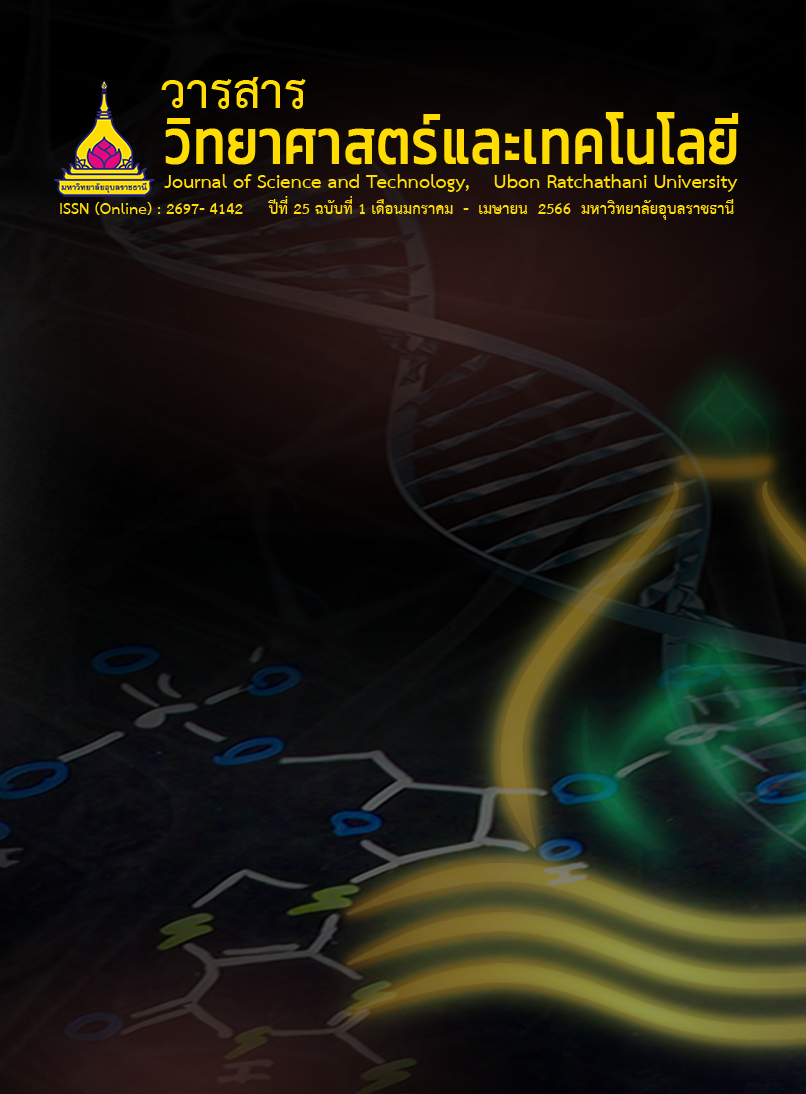การพัฒนาทักษะการคิดแก้ปัญหาอย่างสร้างสรรค์โดยใช้การจัดการเรียนรู้แบบ Ubiquitous Learningสำหรับนักเรียนชั้นมัธยมศึกษาปีที่ 4
Main Article Content
บทคัดย่อ
การศึกษาวิจัยกึ่งทดลองนี้มีวัตถุประสงค์เพื่อพัฒนาทักษะการคิดแก้ปัญหาอย่างสร้างสรรค์โดยใช้การจัดการเรียนรู้แบบ Ubiquitous learning และเพื่อเปรียบเทียบผลสัมฤทธิ์ทางการเรียนระหว่างนักเรียนที่เรียนโดยใช้การจัดการเรียนรู้แบบ Ubiquitous learning (กลุ่มทดลอง) กับนักเรียนที่เรียนโดยการใช้การจัดการเรียนรู้แบบปกติ (กลุ่มควบคุม) ในเรื่องสถิติและข้อมูล กลุ่มเป้าหมายของงานวิจัยนี้ ได้แก่ นักเรียนชั้นมัธยมศึกษาปีที่ 4 โรงเรียนสาธิตมหาวิทยาลัยขอนแก่น ฝ่ายมัธยมศึกษา (ศึกษาศาสตร์) จำนวน 55 คน ซึ่งเลือกโดยวิธีการเลือกแบบเจาะจง สถิติที่ใช้ในการวิเคราะห์ข้อมูลเชิงปริมาณ ได้แก่ ค่าเฉลี่ยเลขคณิต และส่วนเบี่ยงเบนมาตรฐาน ส่วนการเปรียบเทียบทักษะการคิดแก้ปัญหาอย่างสร้างสรรค์ และผลสัมฤทธิ์ทางการเรียนใช้การวิเคราะห์สถิติแบบ t-test และ ANCOVA (Analysis of Covariance) ผลการวิจัยพบว่าหลังการเรียน ทักษะการคิดแก้ปัญหาอย่างสร้างสรรค์ และผลสัมฤทธิ์ทางการเรียนของนักเรียนในกลุ่มทดลองสูงกว่านักเรียนในกลุ่มควบคุมอย่างมีนัยสำคัญทางสถิติที่ระดับ 0.05 ทั้งนี้ข้อเสนอแนะสำหรับงานวิจัยนี้คือ รูปแบบกิจกรรมที่ใช้สำหรับจัดการเรียนรู้ และวิธีการวัดทักษะการคิดแก้ปัญหาอย่างสร้างสรรค์ควรมีความหลากหลายมากขึ้น นอกจากนี้ควรมีการศึกษาแรงจูงใจของผู้เรียนต่อการจัดการเรียนรู้
Article Details

อนุญาตภายใต้เงื่อนไข Creative Commons Attribution-NonCommercial-NoDerivatives 4.0 International License.
บทความที่ได้รับการตีพิมพ์เป็นลิขสิทธิ์ของ วารสารวิทยาศาสตร์และเทคโนโลยี มหาวิทยาลัยอุบลราชธานี
ข้อความที่ปรากฏในบทความแต่ละเรื่องในวารสารวิชาการเล่มนี้เป็นความคิดเห็นส่วนตัวของผู้เขียนแต่ละท่านไม่เกี่ยวข้องกับมหาวิทยาลัยอุบลราชธานี และคณาจารย์ท่านอื่นๆในมหาวิทยาลัยฯ แต่อย่างใด ความรับผิดชอบองค์ประกอบทั้งหมดของบทความแต่ละเรื่องเป็นของผู้เขียนแต่ละท่าน หากมีความผิดพลาดใดๆ ผู้เขียนแต่ละท่านจะรับผิดชอบบทความของตนเองแต่ผู้เดียว
เอกสารอ้างอิง
Ministry of Education, Thailand. 2017. The Basic Core Curriculum B.E. 2551 (A.D. 2008) (Revised Edition B.E. 2560 (A.D. 2017)). Bangkok: Office of the Education Council. (in Thai)
Kushwaha, K.S. and Kumar, R. 2020. Basic Concepts in Statistics. New Delhi: New India Publishing Agency.
Kongterm, S. 2020. The curriculum development to enhance the 21st century learning skills for the teacher students of Phetchabun Rajabhat University. In: Proceedings of the 12th Nakhon Pathom Rajabhat University National Academic Conference, 9-10 July 2020. Nakhon Pathom, Thailand. (in Thai)
Chompoopat, S. 2011. Development of Teaching Behaviors for Creative Problem Solving of Teachers. and Students in Schools, Promoting Students with Scientific Talents Using Critical Practical Research. Ph.D. thesis, Srinakharinwirot University. (in Thai)
Vongthatam, P. 2015. Creative problem-solving 21st century thinking skills. Journal of Education, Khon Kaen University. 38(2). 111-121. (in Thai)
Office of the Royal Thai Council. 2015. Dictionary of Contemporary Academic Terms. Bangkok: Office of the Royal Thai Council. (in Thai)
Cardenas-Robledo, L.A. and Pena-Ayala, A. 2018. Ubiquitous learning: A systematic review. Telematics and Informatics. 35(5): 1097-1132.
Jones, V. and Jo, J.H. 2004. Ubiquitous learning environment: An adaptive teaching system using ubiquitous technology. In: Proceedings of the 21st ASCILITE Conference, 5-8 December 2004. Perth, Western Australia.
Yahya, S., Ahmad, E.A. and Jalil, K.A. 2010. The definition and characteristics of ubiquitous learning: A discussion. International Journal of Education and Development using Information and Communication Technology. 6(1): 117-127.
Zhang, G, Jin, Q and Lin, M. 2005. A framework of social interaction support for ubiquitous learning. In: Proceedings of the 19th International Conference on Advanced Information Networking and Applications, 28-30 March 2005. Taipei, Taiwan.
Thepnuan, N. 2019. Development of Ubiquitous learning to enhance problem-solving process skills for higher education. Veridian E-Journal, Silapakorn University. 12(3). 443-448. (in Thai)
Junkam, N. and Phanlamjeak, K. 2019. Developing courseware for Ubiquitous learning at to 21st century learning skills in creativity in higher education. The Journal of Social Communication Innovation (Humanities, Social Sciences and Arts). 7(1): 104-112. (in Thai)


